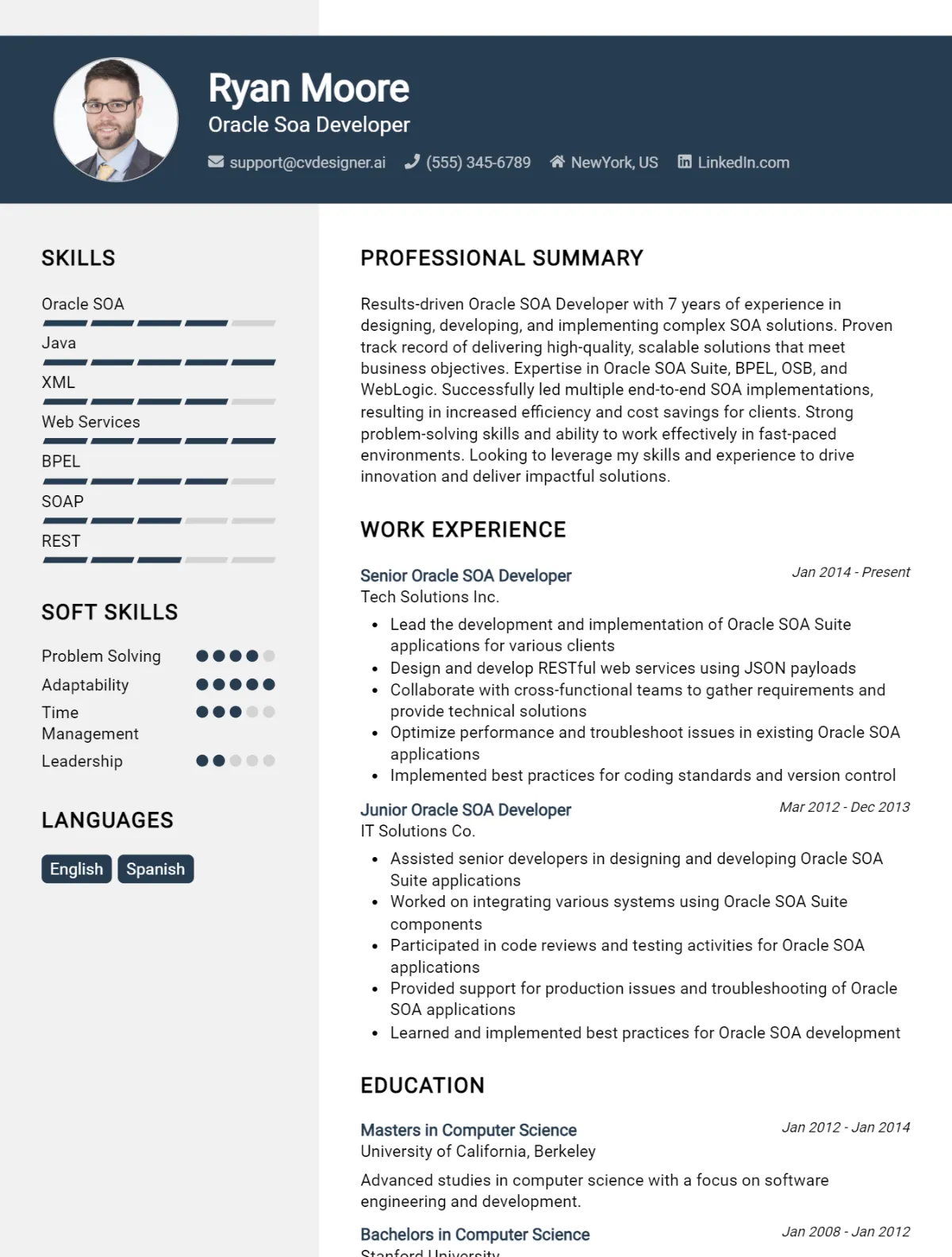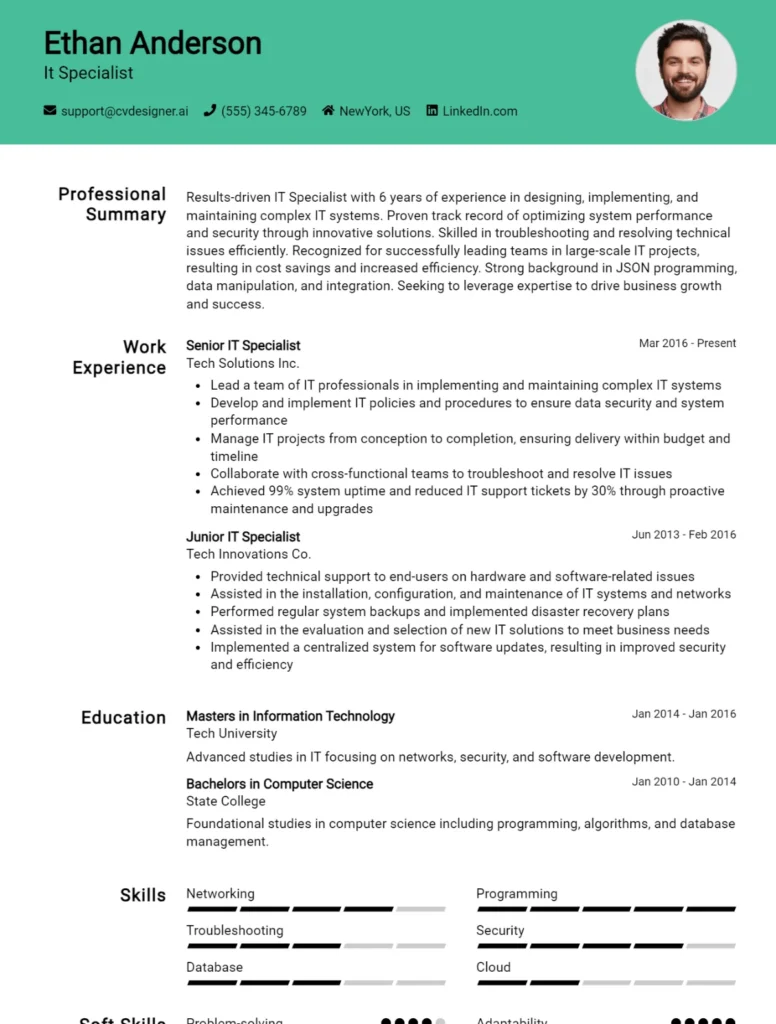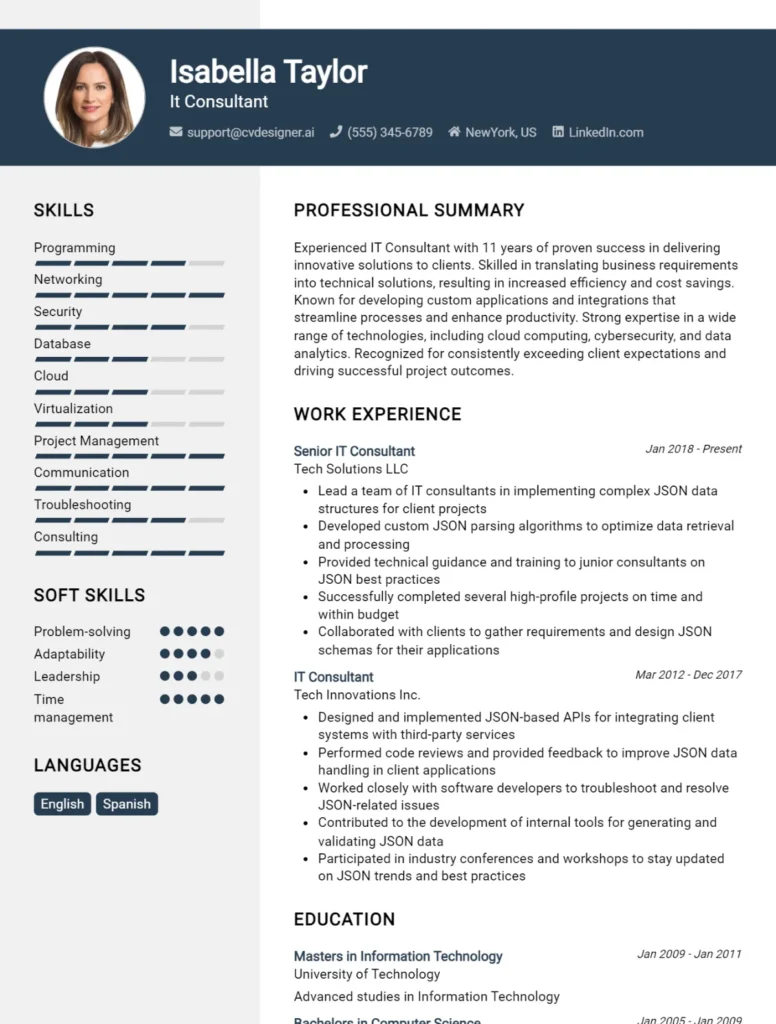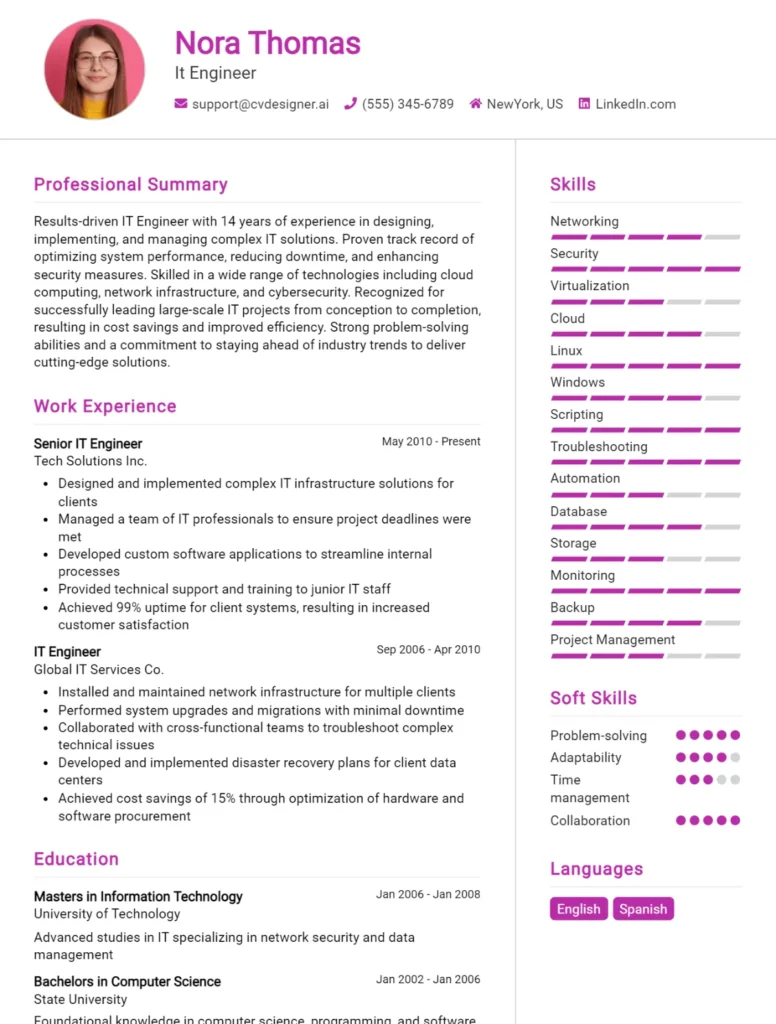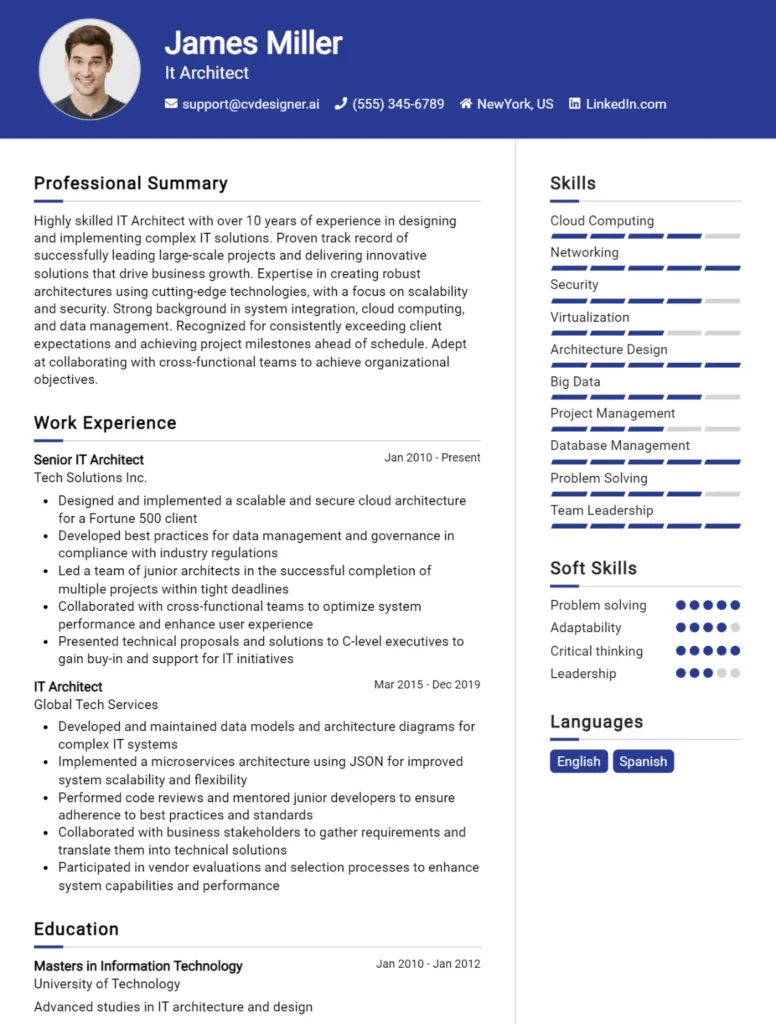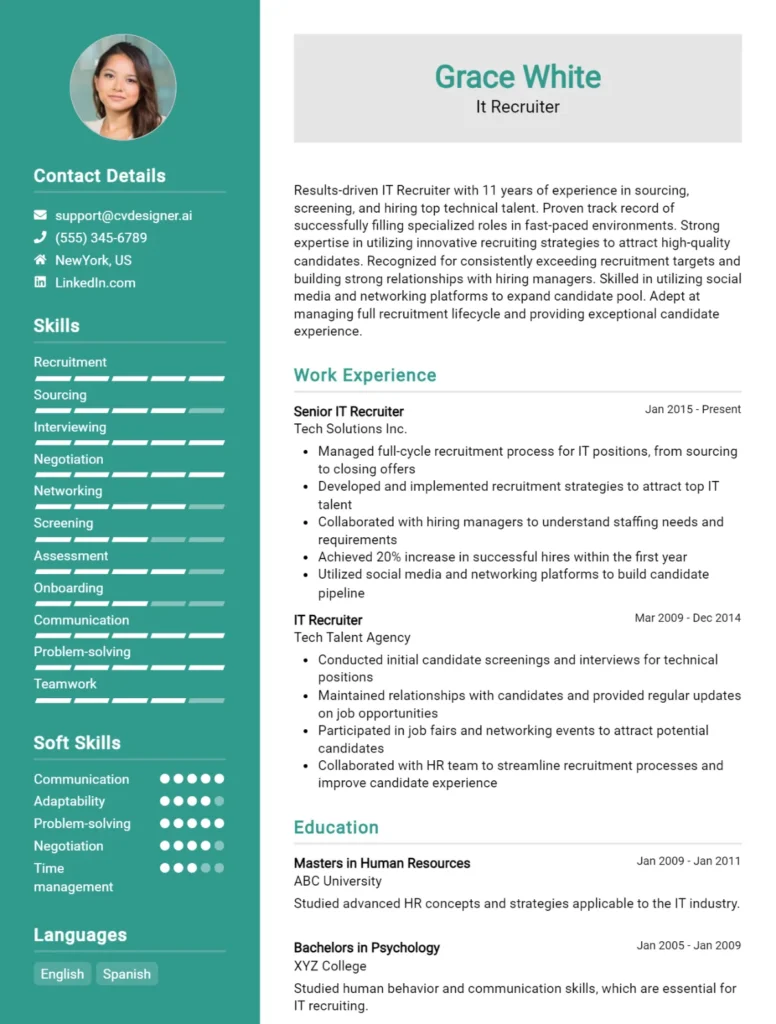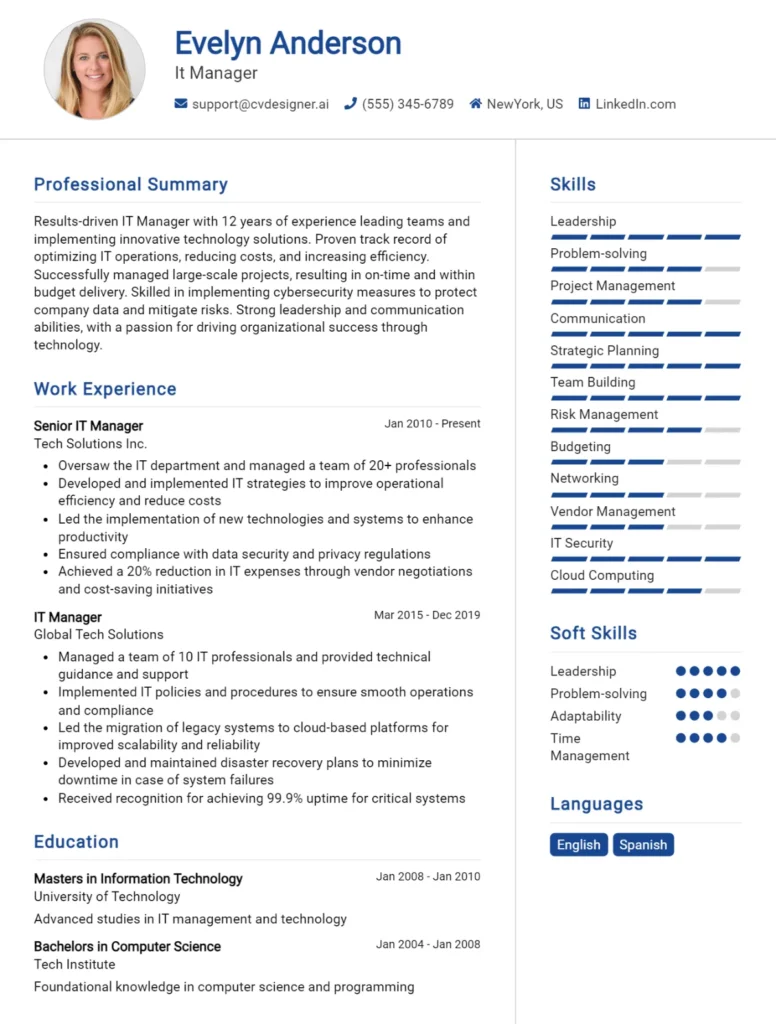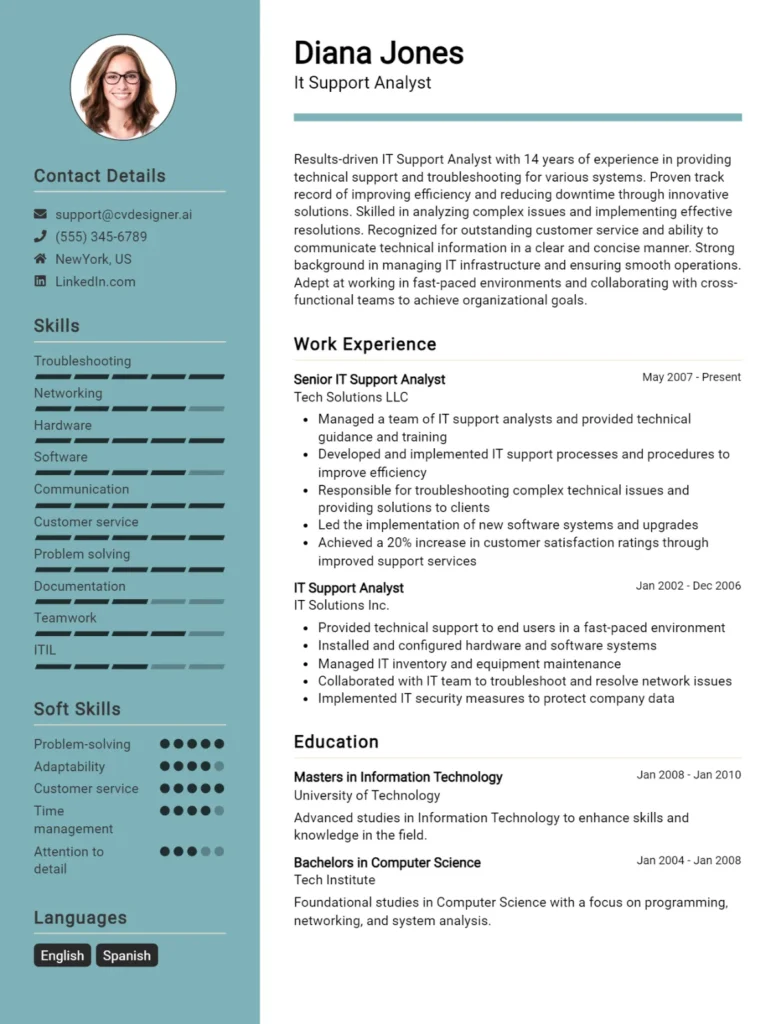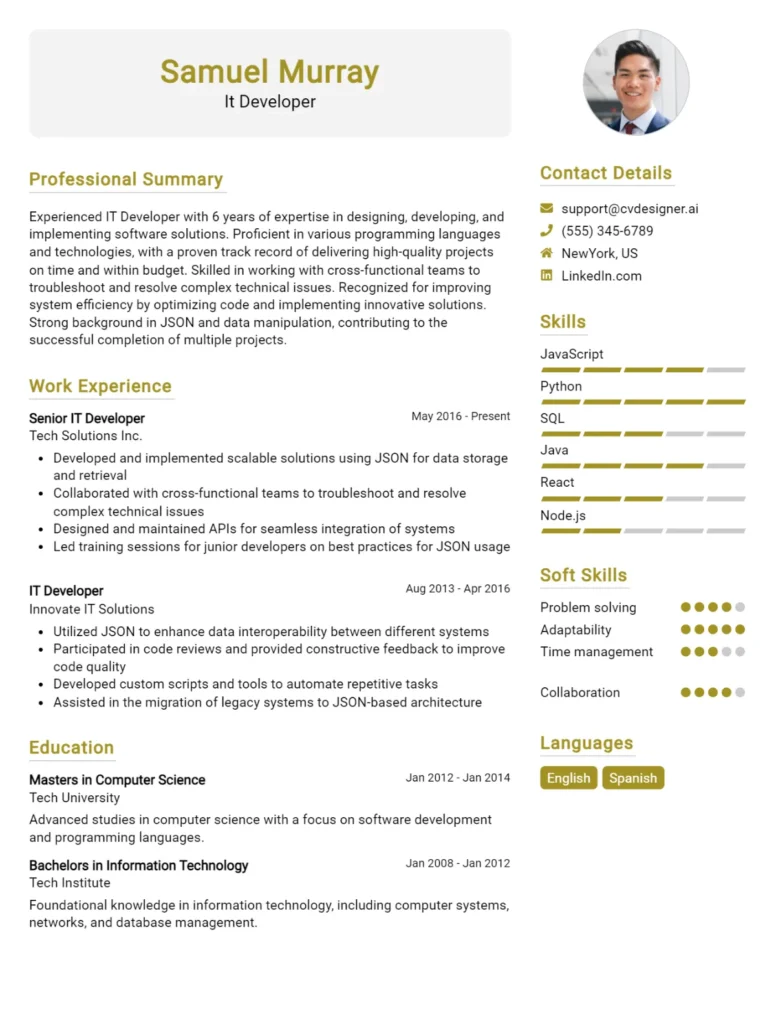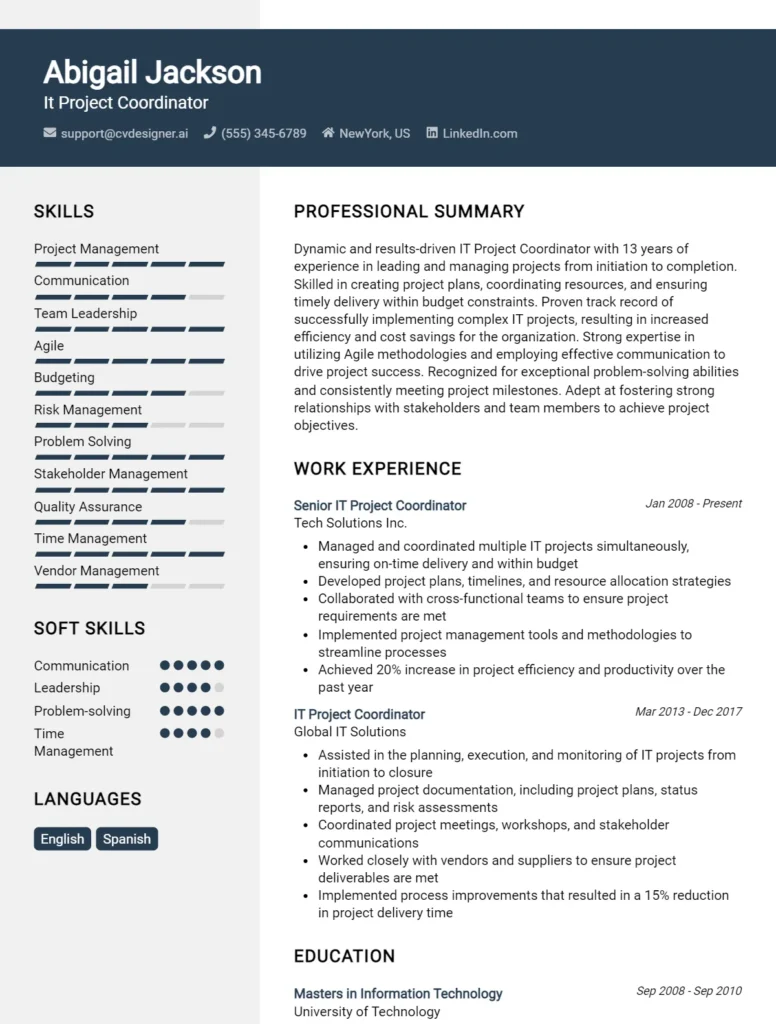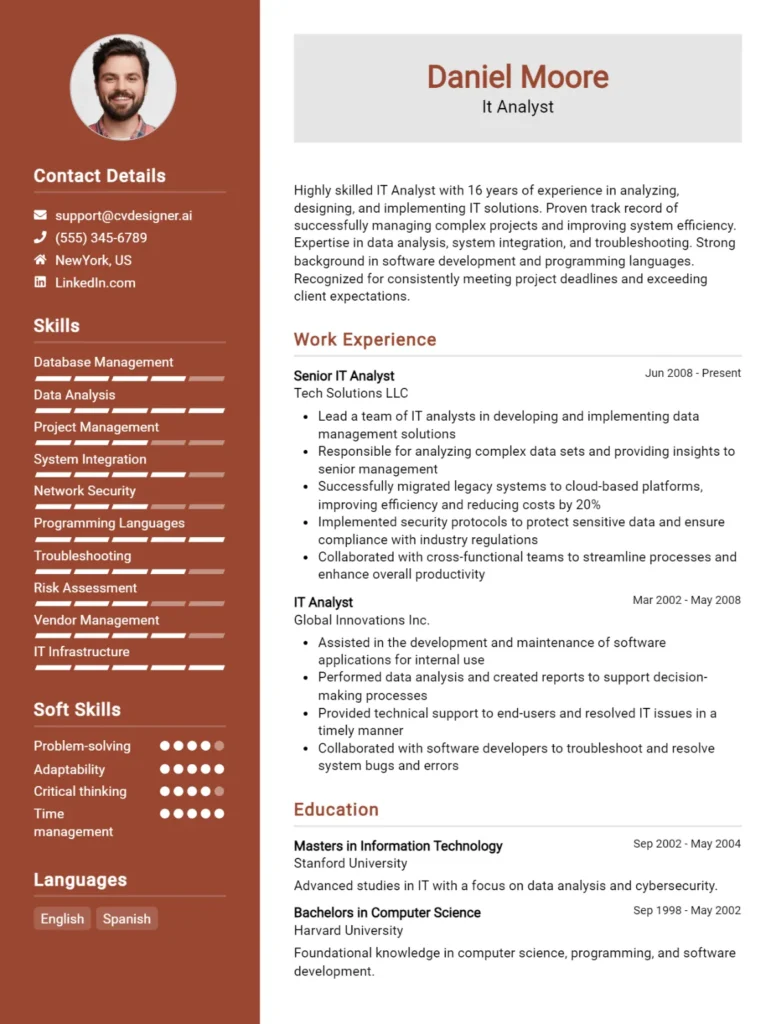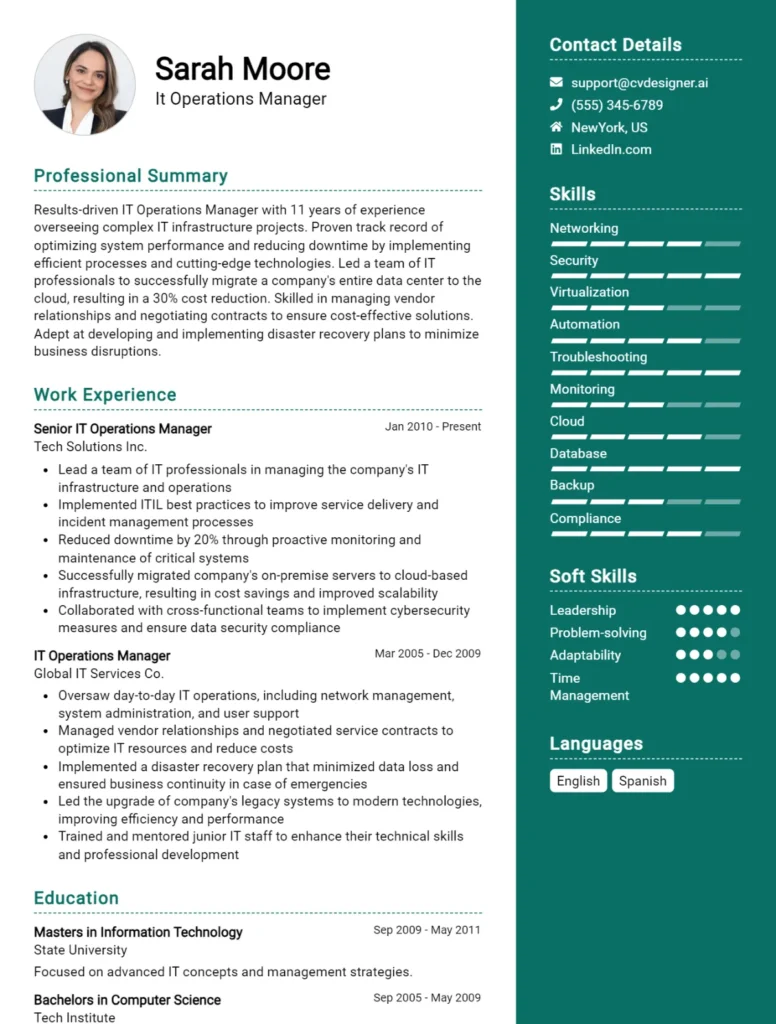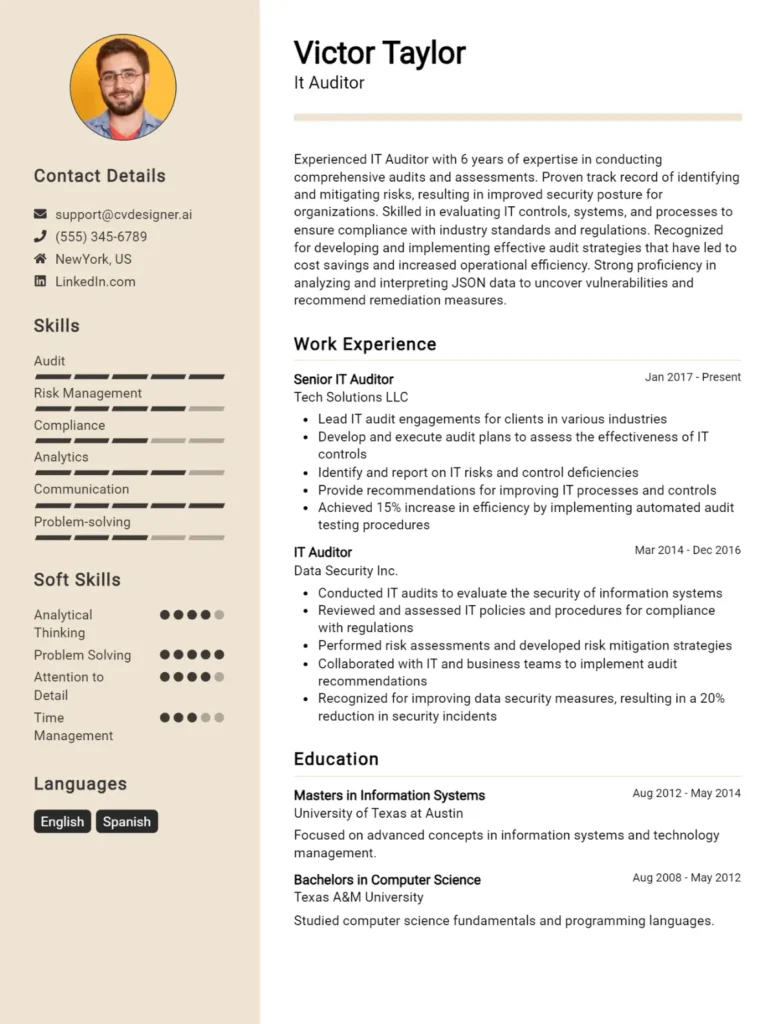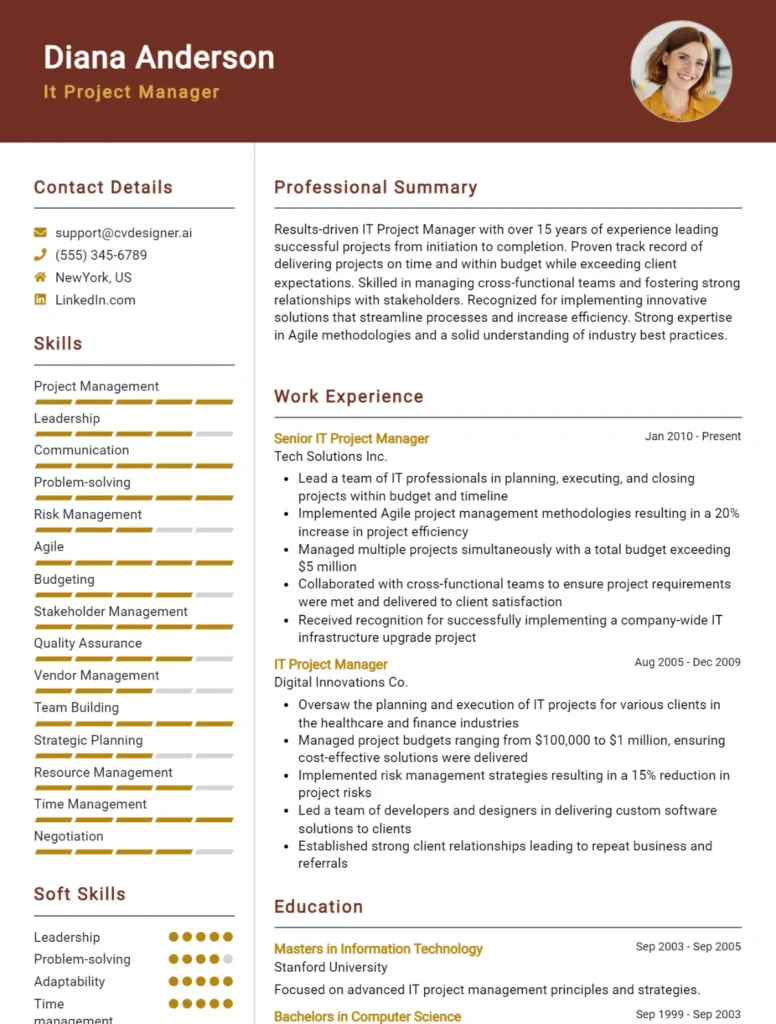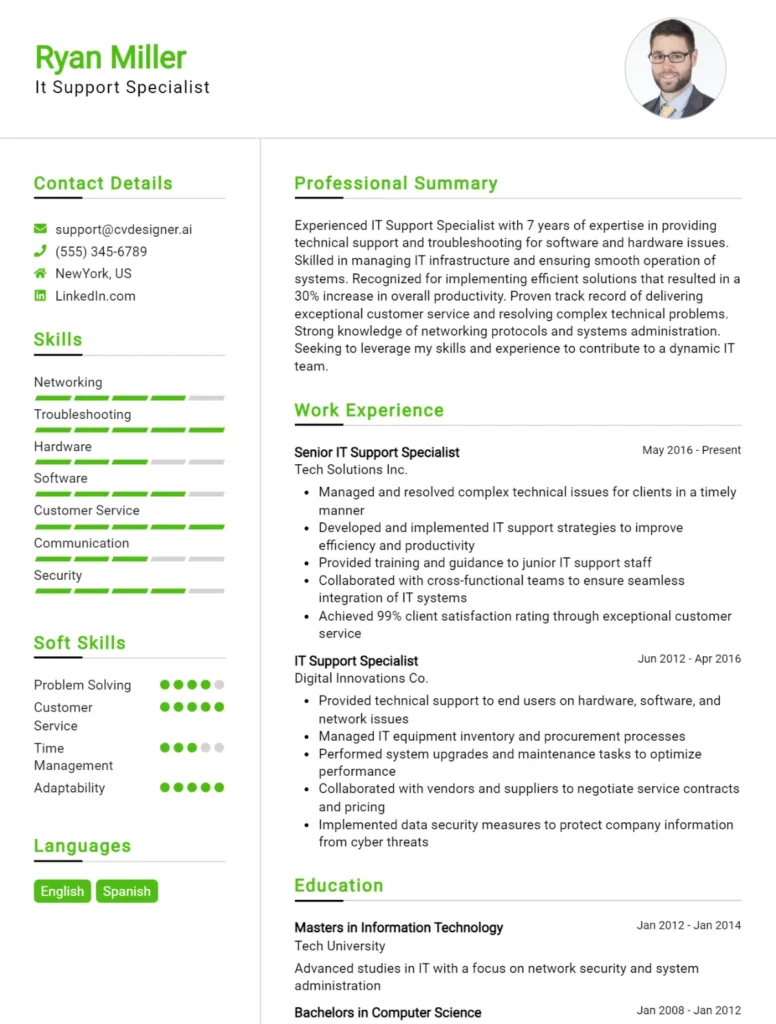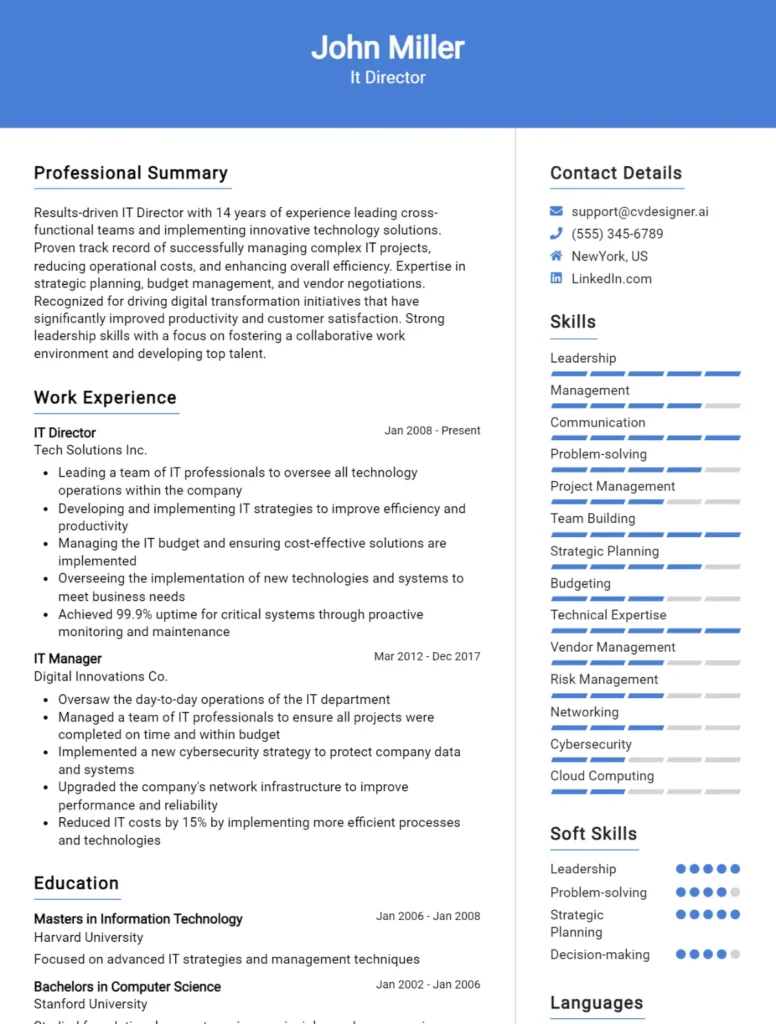Most Popular It Security Engineer CV Examples
Explore additional It Security Engineer CV samples and guides and see what works for your level of experience or role.
As the digital landscape continues to evolve, the importance of robust IT security has never been more critical. An IT Security Engineer plays a pivotal role in safeguarding an organization’s information systems from cyber threats, making this position both challenging and rewarding. Crafting a standout CV is essential for showcasing your expertise and landing that dream job in this competitive field. In this article, we’ll guide you through the essential elements of writing an impressive IT Security Engineer CV, complete with a practical example to inspire you. Here’s what you can expect to learn:
- Key Skills to Highlight: Identifying the technical and soft skills that are crucial for IT Security Engineers.
- Tailoring Your CV: Tips on customizing your CV to align with specific job descriptions and employer expectations.
- Formatting and Structure: Guidance on the most effective layout to ensure your CV is both appealing and easy to read.
- Showcasing Achievements: Strategies for presenting your professional accomplishments in a way that captures attention.
- Common Mistakes to Avoid: Insights into pitfalls that could undermine your CV and how to steer clear of them.
Dive into this comprehensive guide and equip yourself with the knowledge needed to create a compelling CV that sets you apart in the IT security arena!
What is a IT Security Engineer CV?
A CV for an IT Security Engineer serves as a vital tool in showcasing the candidate's technical skills, qualifications, and experiences relevant to the field of cybersecurity. It highlights critical competencies such as knowledge of security protocols, risk management, and incident response, which are essential for protecting an organization's information systems. A well-crafted CV not only conveys the applicant's expertise but also demonstrates their ability to communicate complex technical concepts clearly, an important trait for collaboration with other IT professionals and stakeholders. For guidance on how to create an impactful CV, you can refer to this comprehensive cv writing guide.
In addition to detailing professional skills and experiences, an effective IT Security Engineer CV should also reflect the candidate's commitment to ongoing professional development, such as certifications in cybersecurity frameworks and technologies. This is crucial in a field that is constantly evolving due to new threats and advancements in technology. Utilizing a cv maker can streamline the process of crafting a professional and visually appealing CV, ensuring that it stands out to potential employers. By investing time in developing a strong CV, IT Security Engineers can significantly enhance their chances of securing interviews and ultimately, job offers in a competitive job market.
Key Components of a IT Security Engineer CV
- Contact Information: Include your full name, phone number, email address, and LinkedIn profile link to ensure potential employers can easily reach you.
- Professional Summary: A brief statement summarizing your experience, skills, and career objectives tailored to the IT security field.
- Technical Skills: Highlight your key skills, such as network security, firewall configuration, intrusion detection systems, and threat assessment.
- Certifications: List relevant certifications, such as Certified Information Systems Security Professional (CISSP), Certified Ethical Hacker (CEH), or CompTIA Security+.
- Work Experience: Detail your work experience in IT security roles, emphasizing specific responsibilities, technologies used, and accomplishments.
- Education: Include your highest degree, relevant fields of study, and any additional training related to IT security.
- Projects: Describe significant projects you've worked on, focusing on your role, technologies applied, and the impact of the project on organizational security.
- Tools and Technologies: Mention specific security tools and technologies you are proficient in, such as SIEM systems, antivirus software, or encryption technologies.
- Soft Skills: Highlight important soft skills relevant to the role, including problem-solving, attention to detail, communication, and teamwork.
- Professional Affiliations: List memberships in professional organizations, such as ISACA or (ISC)², to demonstrate your commitment to the field.
- Publications and Presentations: If applicable, include any articles published or presentations given at conferences related to IT security.
- References: Optionally, state that references are available upon request or include them if specifically required by the employer.
Sample IT Security Engineer CV for Inspiration
[Your Name]
[Your Address]
[City, State, Zip]
[Your Phone Number]
[Your Email Address]
[LinkedIn Profile URL]
Professional Summary
Dedicated and detail-oriented IT Security Engineer with over 5 years of experience in designing, implementing, and managing security solutions. Proficient in risk assessment, vulnerability management, and incident response. Strong understanding of network protocols and security architectures with a proven track record of safeguarding sensitive data and mitigating security threats. Adept at collaborating with cross-functional teams to ensure compliance with industry standards and best practices.
Work Experience
IT Security Engineer
ABC Tech Solutions, San Francisco, CA
June 2020 – Present
- Developed and implemented comprehensive security policies and procedures to protect sensitive data from unauthorized access and cyber threats.
- Conducted regular vulnerability assessments and penetration tests, leading to a 30% reduction in security incidents over two years.
- Collaborated with IT teams to ensure that all systems and applications comply with security standards and best practices.
- Responded to security incidents, coordinating with IT and legal teams to investigate breaches and implement remediation plans.
- Managed firewall configurations and monitored network traffic to detect and respond to potential security breaches.
Junior IT Security Analyst
XYZ Corporation, San Francisco, CA
August 2018 – May 2020
- Assisted in the monitoring of security systems and responding to alerts concerning potential threats or breaches.
- Conducted risk assessments and security audits to identify vulnerabilities and recommend corrective actions.
- Developed user training materials on security best practices to raise awareness among employees.
- Maintained documentation of all security incidents and responses to ensure compliance and facilitate future audits.
IT Support Specialist
Tech Solutions Inc., San Francisco, CA
June 2016 – July 2018
- Provided technical support to clients, troubleshooting hardware and software issues while ensuring data security and integrity.
- Assisted with the implementation of IT security measures, including antivirus installations and network security protocols.
- Monitored user access and permissions to maintain a secure computing environment.
Education
Bachelor of Science in Computer Science
University of California, Berkeley
Graduated: May 2016
Skills
- Network Security
- Risk Assessment and Management
- Vulnerability Scanning Tools (Nessus, Qualys)
- Incident Response and Forensics
- Security Information and Event Management (SIEM)
- Firewalls and Intrusion Detection Systems (IDS)
- Penetration Testing
- Compliance Standards (ISO 27001, NIST)
- Scripting Languages (Python, PowerShell)
- Strong Analytical and Problem-Solving Skills
Certifications
- Certified Information Systems Security Professional (CISSP)
- Certified Ethical Hacker (CEH)
- CompTIA Security+
- Certified Information Security Manager (CISM)
Publications
- “Emerging Threats in Cybersecurity: Best Practices for Organizations,” Journal of Cybersecurity Trends, March 2023.
- “The Importance of Security Awareness Training in the Workplace,” Cyber Defense Magazine, August 2022.
[References available upon request]
IT Security Engineer CV Writing Tips
When crafting a CV for an IT Security Engineer position, it’s essential to highlight both your technical skills and your problem-solving abilities. Start with a strong summary statement that showcases your experience in cybersecurity and your understanding of risk management. Use clear, concise language and focus on quantifiable achievements that demonstrate your impact in previous roles. Tailor your CV to match the specific job description by incorporating relevant keywords, and don’t forget to showcase your familiarity with industry standards and compliance regulations. A well-organized CV that balances technical expertise with practical experience will make a compelling case for your candidacy.
- Tailor Your CV: Customize your CV for each job application by including relevant keywords from the job description.
- Highlight Certifications: List relevant certifications such as CISSP, CEH, or CISM prominently to showcase your qualifications.
- Quantify Achievements: Use numbers to quantify your accomplishments (e.g., "Reduced security breaches by 30% through improved protocols").
- Technical Skills Section: Include a dedicated section for technical skills, detailing specific tools and technologies you are proficient in (e.g., firewalls, intrusion detection systems).
- Professional Experience: Focus on your professional experience in reverse chronological order, emphasizing roles that are relevant to security engineering.
- Soft Skills Matter: Don’t forget to include crucial soft skills such as communication, teamwork, and analytical thinking, as these are important in security roles.
- Keep It Concise: Aim for a CV length of 1-2 pages, keeping the content relevant and avoiding unnecessary details.
- Proofread: Ensure there are no grammatical or spelling errors, as attention to detail is critical in IT security roles.
IT Security Engineer CV Summary Examples
As an IT Security Engineer, your CV summary is a critical part of showcasing your skills, experience, and professional objectives. A well-crafted summary can effectively highlight your expertise in safeguarding information systems, managing security protocols, and mitigating risks. Here are several examples of compelling CV summaries tailored for an IT Security Engineer role:
Detail-oriented IT Security Engineer with over 5 years of experience in cybersecurity management, vulnerability assessment, and incident response. Proven track record in implementing robust security measures and improving system integrity, while collaborating with cross-functional teams to enhance organizational security posture.
Results-driven IT Security Engineer with extensive knowledge of network security protocols and risk assessment methodologies. Skilled in designing and deploying security solutions that protect sensitive data and ensure compliance with industry regulations. Passionate about staying ahead of emerging threats and continuously improving security frameworks.
Dynamic IT Security Engineer with a strong background in developing and enforcing security policies and procedures. Over 7 years of experience in threat detection, security audits, and incident management. Adept at utilizing advanced security tools and technologies to safeguard enterprise environments.
Proactive IT Security Engineer with expertise in firewall management, intrusion detection systems, and security information event management (SIEM). Committed to enhancing organizational security through strategic planning and implementation of cutting-edge security technologies. Strong analytical skills to assess potential vulnerabilities and develop effective solutions.
Dedicated IT Security Engineer with a comprehensive understanding of encryption, identity management, and risk mitigation strategies. Over 6 years of experience in protecting critical infrastructures and managing security incidents. Excellent communicator with a collaborative approach to problem-solving and security enhancements.
Build a Strong Experience Section for Your IT Security Engineer CV
As an IT Security Engineer, showcasing your relevant work experience is crucial to demonstrating your expertise and competencies in safeguarding information systems. Below are examples of strong work experience descriptions that highlight key responsibilities and achievements in the field of IT security.
- Developed and implemented a comprehensive security framework that reduced vulnerability exposure by 40%, leading to a significant decrease in security incidents within the organization.
- Conducted regular security audits and risk assessments, identifying potential threats and vulnerabilities, which resulted in the establishment of a proactive security posture and a 30% reduction in identified risks.
- Collaborated with cross-functional teams to design and deploy a multi-layered security architecture, incorporating firewalls, intrusion detection systems, and endpoint protection solutions, thereby enhancing overall network security.
- Led incident response efforts during security breaches, coordinating with IT and legal teams to investigate incidents, mitigate damages, and implement corrective actions, resulting in improved response times and a 25% decrease in recurrence of similar incidents.
- Spearheaded the development and delivery of security awareness training programs for employees, increasing overall cybersecurity awareness and compliance by 50%, as measured by post-training assessments.
- Managed the configuration and maintenance of security tools such as SIEM, IDS/IPS, and DLP systems, ensuring optimal performance and enabling real-time threat detection and response capabilities.
- Evaluated and recommended new security technologies and solutions, resulting in the successful implementation of advanced encryption protocols that enhanced data protection for sensitive information.
- Authored and maintained robust security policies and procedures in accordance with industry standards and regulatory requirements, ensuring compliance and fostering a culture of security within the organization.
IT Security Engineer CV Education Examples
An IT Security Engineer plays a critical role in safeguarding an organization's information systems and data from cyber threats. A strong educational background is essential for candidates aspiring to excel in this field. Here are some examples of relevant educational qualifications that can enhance a CV for an IT Security Engineer role:
- Bachelor’s Degree in Computer Science: A foundational degree that covers essential programming, networking, and system architecture concepts, providing a comprehensive understanding of the technology landscape.
- Bachelor’s Degree in Information Technology: This degree focuses on the practical applications of technology in business settings, including courses on network security, database management, and information systems.
- Master’s Degree in Cybersecurity: An advanced degree that delves deeper into advanced security protocols, risk management, and cybersecurity policies, preparing candidates for high-level positions in IT security.
- Certification in Information Systems Security Professional (CISSP): Although not a degree, this globally recognized certification demonstrates expertise in various security domains, including access control, security architecture, and incident response.
- Bachelor’s Degree in Network Engineering: This program emphasizes the design and management of networks, including securing network infrastructures, which is crucial for an IT Security Engineer's role.
Skills to Highlight in Your IT Security Engineer CV
As an IT Security Engineer, showcasing a blend of technical expertise and interpersonal skills is crucial for effectively safeguarding an organization's information systems. Your CV should reflect not only your proficiency in security technologies but also your ability to collaborate, communicate, and adapt in a rapidly changing environment. Below is a list of essential soft and hard skills that can enhance your CV and demonstrate your qualifications for this vital role.
Soft Skills:
- Problem-solving: Ability to analyze complex security issues and develop effective solutions.
- Communication: Clear articulation of technical concepts to non-technical stakeholders.
- Teamwork: Collaborating with cross-functional teams to strengthen security measures.
- Attention to detail: Meticulous approach to identifying vulnerabilities and ensuring compliance.
- Adaptability: Flexibility to adjust to new threats and evolving technologies.
- Critical thinking: Evaluating risks and making informed decisions under pressure.
- Time management: Prioritizing tasks to meet deadlines in high-stress situations.
- Conflict resolution: Managing disputes effectively, particularly in incident response scenarios.
- Leadership: Guiding teams in implementing security protocols and best practices.
- Empathy: Understanding user perspectives to enhance security training and awareness.
Hard Skills:
- Network security: Expertise in firewalls, VPNs, and intrusion detection systems.
- Risk assessment: Proficient in conducting security audits and vulnerability assessments.
- Incident response: Skilled in developing and executing incident response plans.
- Security protocols: Familiarity with standards such as ISO 27001, NIST, and GDPR.
- Penetration testing: Experience in simulating attacks to identify weaknesses in systems.
- Encryption technologies: Knowledge of cryptographic protocols and secure communication.
- Security information and event management (SIEM): Proficient in using SIEM tools for threat monitoring.
- Malware analysis: Ability to analyze and mitigate malware threats.
- Cloud security: Understanding of security measures for cloud-based infrastructures.
- Programming: Proficient in languages such as Python, Java, or C++ for security tool development.
IT Security Engineer CV Format
As an IT Security Engineer, your CV must effectively showcase your technical skills, certifications, and relevant experience while also demonstrating your ability to protect an organization’s information systems. The best format for your CV can vary depending on your level of experience—entry-level, mid-level, or senior-level positions.
For entry-level roles, a chronological format is often ideal as it highlights education and internships. For mid-level positions, a combination format that emphasizes both skills and experience is recommended. Senior-level candidates should utilize a targeted format, focusing on accomplishments and strategic contributions to enhance cybersecurity initiatives.
- Tailor your CV to highlight relevant certifications such as CISSP, CISM, or CEH that demonstrate your expertise in IT security.
- Use quantifiable achievements to showcase your impact, such as reducing security breaches by a certain percentage or implementing new protocols that improved efficiency.
- Include specific technologies and tools you are proficient in, such as firewalls, intrusion detection systems, or SIEM solutions.
- Emphasize your experience with risk assessment and compliance standards (e.g., ISO 27001, NIST, GDPR) that are critical in the field of IT security.
- Highlight your problem-solving abilities and your experience in incident response, showcasing your capacity to handle real-world security challenges.
- Consider adding a section for professional development, including conferences, workshops, or continuous learning courses that keep you updated on the latest in cybersecurity.
For more details on crafting the perfect CV format, visit the cv format page.
Common Mistakes to Avoid in a IT Security Engineer CV
When crafting a CV for an IT Security Engineer position, it's essential to present your skills and experience effectively to stand out in a competitive job market. A well-structured CV not only highlights your qualifications but also avoids common pitfalls that can detract from your professionalism. Below are some typical mistakes to steer clear of when creating your IT Security Engineer CV:
- Using Generic Job Descriptions: Tailoring your CV to reflect the specific requirements of the job you're applying for is crucial; avoid using one-size-fits-all descriptions.
- Neglecting to Highlight Relevant Certifications: Ensure that your CV prominently features important certifications like CISSP, CISM, or CEH, as these are critical for roles in IT security.
- Including Irrelevant Work Experience: Focus on relevant positions and skills; avoid cluttering your CV with unrelated job experiences that don't pertain to IT security.
- Overloading with Technical Jargon: While technical skills are essential, too much jargon can make your CV difficult to read; aim for clarity and conciseness.
- Failing to Demonstrate Problem-Solving Skills: IT Security Engineers need strong analytical and problem-solving abilities; be sure to provide examples of how you've successfully addressed security challenges.
- Using an Unprofessional Email Address: Your email address should be professional; avoid using nicknames or playful terms that may not convey seriousness.
- Ignoring Soft Skills: While technical expertise is crucial, soft skills like teamwork, communication, and leadership are also important; include examples that showcase these abilities.
- Not Updating the CV Regularly: Ensure your CV reflects your most recent experiences and skills; regularly update it to keep it relevant.
- Neglecting Formatting and Readability: A cluttered or poorly formatted CV can distract hiring managers; use bullet points, headings, and a clean layout to enhance readability.
- Omitting Quantifiable Achievements: Whenever possible, quantify your accomplishments (e.g., "improved system security by 30%") to provide concrete evidence of your impact in previous roles.
Key Takeaways for a IT Security Engineer CV
- Contact Information: Clearly list your name, phone number, email address, and LinkedIn profile at the top of your CV for easy access.
- Professional Summary: Craft a compelling summary that highlights your experience, key skills, and career goals in IT security, making it relevant to the job you’re applying for.
- Relevant Experience: Detail your work history, focusing on your roles and achievements in IT security. Use bullet points to outline specific responsibilities and contributions.
- Technical Skills: List essential IT security skills such as firewall management, intrusion detection systems, vulnerability assessment, and knowledge of compliance standards (e.g., ISO 27001, NIST).
- Certifications: Include relevant certifications such as CISSP, CEH, CISM, or CompTIA Security+ that demonstrate your expertise and commitment to the field.
- Education: Provide information about your degree(s) in computer science, information technology, or a related field. Mention any honors or relevant coursework.
- Projects and Accomplishments: Highlight key projects you’ve worked on, such as security audits, incident response plans, or security architecture designs, showing measurable results.
- Soft Skills: Emphasize important soft skills such as problem-solving, analytical thinking, communication, and teamwork, which are crucial in IT security roles.
- Tailored Content: Customize your CV for each application by including keywords from the job description to pass through Applicant Tracking Systems (ATS).
- Professional Affiliations: Mention memberships in professional organizations like (ISC)², ISACA, or local cybersecurity groups to showcase your commitment to the industry.
- Portfolio or Projects: If applicable, include links to a portfolio or GitHub profile showcasing your coding skills or security projects.
- Formatting: Ensure your CV is well-structured and easy to read. You can use cv templates to find a design that fits your personal style.
For a more streamlined approach to creating your CV, consider using a cv builder that guides you through each section. Additionally, don’t forget to pair your CV with a strong cover letter by utilizing cover letter templates to further enhance your application.
Build your CV in minutes
Use an AI-powered cv builder and have your cv done in 5 minutes. Just select your template and our software will guide you through the process.
